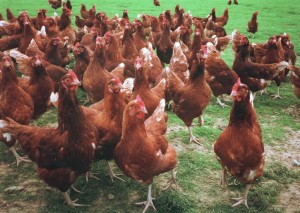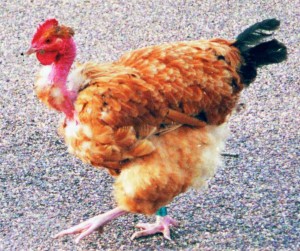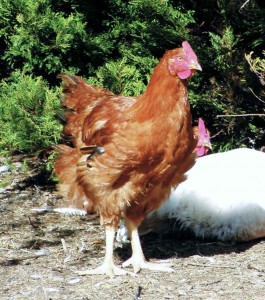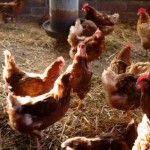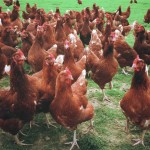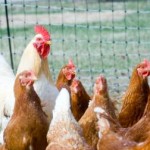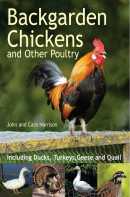Whether growing on your male chicks or getting specialist meat breeds keeping chickens for meat at home is becoming increasingly popular. With increasing coverage of factory farming methods of chicken and poultry in general growing a few chickens at home for your Sunday dinner is becoming prevalent with home chicken keepers
Which Breed of Table Chicken to Get?
One of the first things to consider is what breed of chicken you wish to rear for the table. There are a number of options here.
Raising from Hatching Eggs
If hatching chicks to supplement your current egg laying flock or to keep hens as pets you can just grow on your cockerels for meat. Cock birds are notoriously hard to re-home and this method is best suited to larger breeds that will have more meat on them.
A bantam breed is not going to make a good table bird because of their small size, although the taste would be just as good as home reared larger fowl.
Dual Purpose (Meat & Egg) Breeds of Chicken
You could pick to hatch a specific dual-purpose breed of chicken to replace egg layers and provide large meat cock birds for the tables.
Breeds such as the Sussex, Dorking or even the Transylvanian Naked Neck (which also saves you some plucking after dispatch) are good dual-purpose breeds.
The hens are good large egg layers and although not as prolific as hybrids they have a longer laying life and are consistent layers even through the winter months. The cock birds will grow at the same rate as the hens and may be kept together, but for a fuller weight bird separation and finishers feed is recommended once the hens are moved onto layers pellets.
Most cock birds will be ready for the table by 18 weeks, or perhaps when they first crow which can be from 16 weeks onwards for a smaller carcass or can be left to 28 weeks for a nice large and full flavoured bird.
Specific Table Breeds (Broilers)
You could raise table specific breeds (broilers) such as Hubbards, the Cornish-Rock or the Ixworth.
The main problems with modern commercial breeds specifically designed for meat is that they grow incredibly fast and sometimes struggle to take advantage of free range facilities even when the are available as they struggle to move great distances.
Economically this would be the cheapest method of raising meat for the table, as the birds will be ready for the table sooner than a dual-purpose reared cock bird. A specific meat bird can be ready for the table with a dressed weight of 2-4lbs within 8 weeks.
A broiler chicken raised at home, if provided with space and stimulus, will have had a far happier life than one raised in a commercial chicken farm.
The free-range chicken you buy from the supermarket will be from one of these fast growing breeds, so you will by giving them space to choose to roam be giving them at least the same standard of life as a free-range commercial bird.
Don’t Forget Taste!
Something to remember when rearing for the table is taste as well as cost. With broilers the taste in my opinion is not as good as a well raised free-range cock bird. If you are raising birds to make sure your meat has had a happy life before being culled, the dual-purpose breeds are a better option.
A cock bird raised free range will still cost less than the equivalent supermarket or butchers free-range bird, although a few pounds more than the broiler chicken.
Raising Table Birds
Keeping Chickens for Meat - Costs & Returns - The Economics
Keeping Chickens for Meat, Table Birds Best Chicken Breeds
Keeping Chickens for Meat - Raising & Feeding Table Birds
More Articles on Keeping Chickens
- 7 Important Things You Need To Take Care Of Chickens
- Chickens Illness & Problems
- Low Cost Hens – Finding Cheap Hens and Housing for them
- Starting Keeping Hens – A Basic Guide
- Chickens in Winter – The Garden
- Back Garden Chicken Keeping – Hens at Home in the Garden
- Low Cost Hens – Feeding Frugally
- Low Cost Chicken Coops – Budget Hen Houses
- Keeping Chickens on a Budget – Getting & Housing Your Hens
- Keeping Chickens on a Budget – Feeding, Watering & Protecting Your Hens
- Keeping Chickens Warm in Winter
- What to Feed Chickens in Winter
- Incubating Chickens & Ducks
- Keeping Chickens for Meat – Costs & Returns – The Economics
- Incubating Chickens & Ducks, Hatching, Sexing & Rearing
- Keeping Chickens for Meat, Table Birds Best Chicken Breeds
- Keeping Chickens for Meat – Raising & Feeding Table Birds

